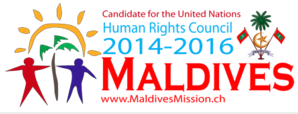The Maldives was re-elected to the UN Human Rights Council for a second term for a period 2014-2016.
In 2010, Maldives was the smallest member to get elected to the Council. The Maldives stood for the voiceless in the international society; for the issues that affect the very fundamental values of human rights yet, hardly get a mention in global human rights debate; and it stood for helping the vulnerable and emerging democracies to cultivate the values of human rights in their societies. Since then, the Maldives is proud to have given a voice to the smallest members of the international community. It has also been a leading voice of advocacy for human rights and fundamental freedoms, spearheading important initiatives in the Council. It has succeeded in drawing global attention to the effects of climate change on the full enjoyment of human rights. It has been one of the strongest advocates at the Council for promoting the rule of law and creating the values of human rights.
Membership of the Human Rights Council: A Catalyst for National Zction
In 2004, the Maldives took a decision to integrate human rights promotion fully into the country's foreign policy. That decision propelled the Maldives from the fringes to the core of international human rights discourse, and assumed leadership role on key issues, such as the impact of climate change on human rights. One important outcome of that decision was, and continues to be, that the country's active role in promoting international human rights has catalytic effect on national actions on some of the sensitive human rights issues.
Key Initiatives at National Level
Since the Maldives began to play a more active role in international human rights issues, particularly, since the country's membership of the Council in 2010, the country has made remarkable progress in its efforts at promoting and protecting human rights nationally. These measures have helped to strengthen the human rights framework in the country and to introduce a rights-based discourse into political and social debates. Some of the key achievements inter alia are:
- Joined the International Labour Organization (ILO) in 2009, and International Organization for Migration (IOM) in 2011. In January 2013, the Maldives ratified all core conventions of the ILO. It was a major policy decision by the Government, considering that the issue was under consideration for nearly two decades;
- In 2010, the Maldivian parliament passed the Disabilities Act, which gave persons with disabilities, legal rights to adequate and standardised social and health services;
- in 2011, the Maldives ratified the Rome Statue of the International Criminal Court (ICC);
- In 2012, Maldives ratified a comprehensive piece of legislation on addressing violence against women, the Domestic Violence Act, which protects and aims to prevent violence and discrimination against women. The Maldives election to the Executive Board of the United Nations Entity for Gender Equality and the Empowerment of Women in 2012 has further boosted its advocacy for gender equality and women's rights domestically;
- In February 2013, Maldives acceded to the United Nations Convention Against Transnational Organised Crime; and
- In April 2013, an inter-ministerial committee was established by the President to conduct a review and propose a holistic reform of the existing child protection mechanisms in the Maldives.
A Record of Achievements: Building Resilience
When the Maldives was elected to the Human Rights Council in 2010, it was the smallest country to occupy that seat. The Maldives stood for the voiceless, the marginalised, and the smallest countries that were on the periphery. Today, the Maldives takes pride that it has created a voice of the small island developing states (SIDS) within the Council. Moreover, the Maldives has, over the last three years, advocated for global efforts at increasing the resilience of SIDS, as well as emerging democracies, in bringing their national human rights mechanisms to international standards. Some important initiatives led and/or supported by the Maldives in this regard include:
- The initiative to establish a Voluntary Fund at the Council aimed at supporting the participation of Least Developed Countries and Small Island Developing States (SIDS) in the work of the Council;
- Chair of an informal group known as Friends of SIDS in the Universal Periodic Review (UPR), to support the SIDS countries that do not have missions in Geneva to continue with their UPR presentation;
- The initiative at the Council that led to the establishment of an Independent Expert on human rights and environment;
- With other like-minded countries, established the Special Rapporteur on the rights to freedom of assembly and association;
- led the negotiations in the introduction of the Third Optional Protocol to the Convention on the Rights of the Child on a communications procedure;
- strongly supported the core-group of countries that called for the creation of the 'Working Group on the Discrimination of Women in Law and in Practice'; and
- Continued to support the cooperative and state-driven nature of the Universal Period Report and its universality. The Maldives believes that this unique process is one of the most effective ways in promoting human rights for all.
Continuing Commitment for Human Rights
At the national level, the Maldives would:
- continue to welcome visits to the Maldives by UN special rapporteurs and independent experts;
- improve the functioning and effectiveness of its independent national institutions;
- convene a Justice Roundtable to discuss strengthening of judiciary in view of the recommendations made by the Special Rapporteur on the Independence of Judges and Lawyers;
- upgrade the status of the Human Rights Commission of Maldives to ensure its full compliance to Paris Principles;
- secure and fully deliver the rights enshrined in the Convention on the Elimination of Discrimination Against Women (CEDAW);
- enact enabling legislations for international human rights instruments so that they are observed and integrated into all aspects of the Maldivian society; and
- follow up on the recommendation of the Universal Periodic Review as well as the concluding observations of treaty bodies.




